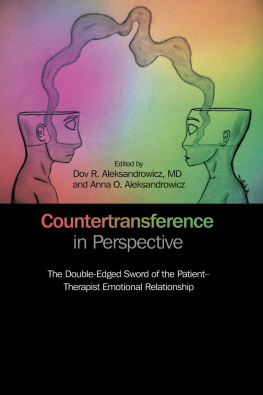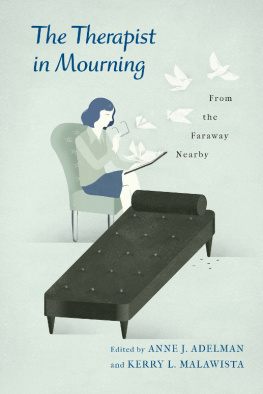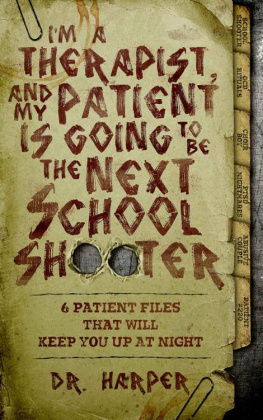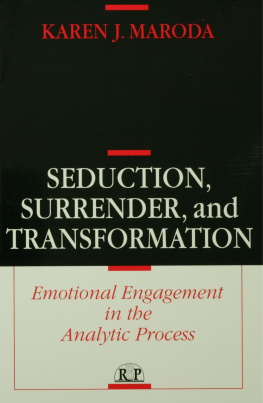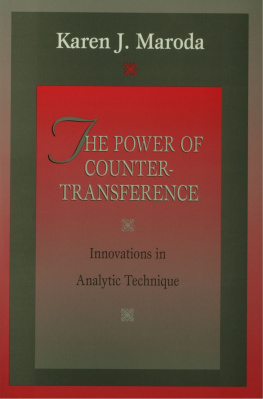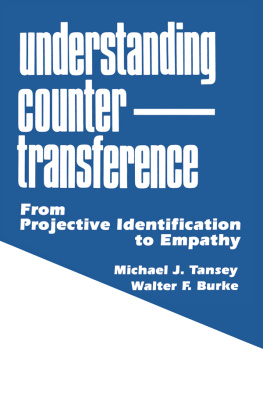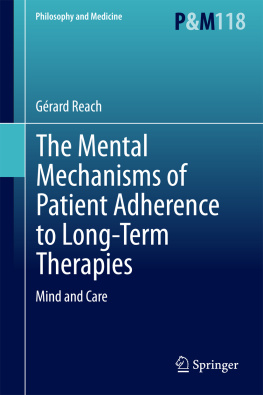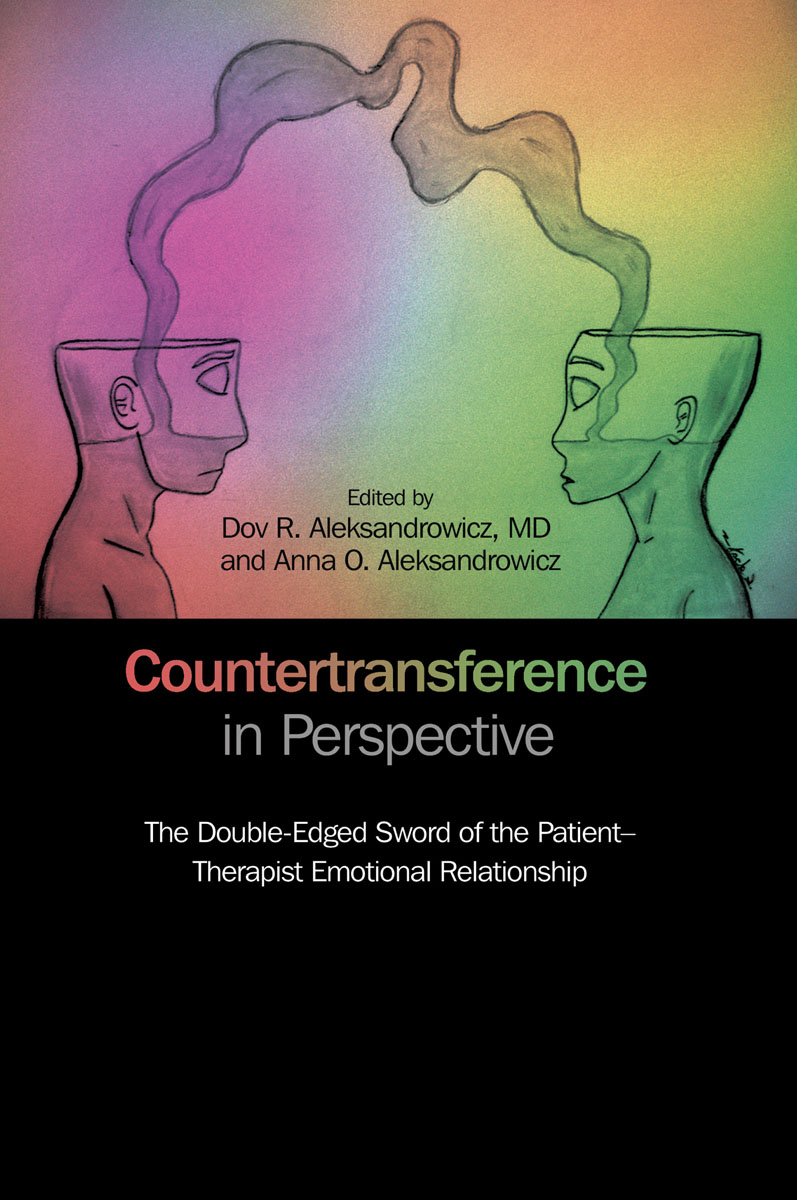
The term countertransference in psychoanalysis was first coined by Freud to describe the complex relationship between therapist and patient. Nowadays, this term is used in a much broader sense, referring to the entire range of emotions experienced by the therapist/analyst, and addressing many different types of therapeutic processes.
Todays mental health practitioners are called upon to deal with a wide variety of challengessome of which carry a high emotional chargesuch as child abuse, gender identity and catastrophic loss.
This book comprises three main parts: presents a range of clinical challenges, analyzed by contributor colleagues with extensive experience in these and similar issues. It also addresses Holocaust survivor issues, and child survivor experiences of the Nazi euthanasia programme.
The study of countertransference, like other psychoanalytic issues, has recently become enriched by striking advances in the study of the living brain and of animal behaviour (such as the published works of Panksepp and Hoffer). of the book provides both a summary of the book as well as an intriguing consideration of how empathy, as a moral basis, could enable the promise and practice of cosmopolitan empathy.
The book is intended for mental health practitioners and students, as well as for other practitioners who are involved in human service, such as physicians, educators, jurists and human resource managers.
Cover illustration: Duality courtesy of The Cunning Condor (http://thecunningcondor.deviantart.com/)
Dr. Dov Aleksandrowicz is a training analyst at the Israeli Institute of Psychoanalysis and a former President of the Israeli Psychoanalytic Society. He is a former Associate Professor and Chairperson of Psychiatry at Ben-Gurion University.
Anna Aleksandrowicz is a science writer and editor, and former editor at Opus Communications.
Dedication
In memory of Malca K. Aleksandrowicz and Yuad S. Brisker
Chapter texts copyright Sussex Academic Press, 2016; Introduction, Conclusion and organization of this volume copyright Dov R. Aleksandrowicz and Anna O. Aleksandrowicz, 2016.
Published in the Sussex Academic e-Library, 2016.
SUSSEX ACADEMIC PRESS
PO Box 139
Eastbourne BN24 9BP, UK
and simultaneously in the United States of America and Canada
All rights reserved. Except for the quotation of short passages for the purposes of criticism and review, no part of this publication may be reproduced, stored in a retrieval system or transmitted in any form or by any means, electronic, mechanical, photocopying, recording or otherwise, without the prior permission of the publisher.
British Library Cataloguing in Publication Data
A CIP catalogue record for this book is available from the British Library.
ISBN 978-1-78284-322-1 (e-pub)
ISBN 978-1-78284-323-8 (e-mobi)
ISBN 978-1-78284-324-5 (e-pdf)
This e-book text has been prepared for electronic viewing. Some features, including tables and figures, might not display as in the print version, due to electronic conversion limitations and/or copyright strictures.
Contents
Inbal Ben-Ami Bartal and Anat Perry
The Contributors
Dov R. Aleksandrowicz, MD, former Associate Professor of Psychiatry at Ben-Gurion University, Beer Sheva, Israel, was the President of the Israeli Psychoanalytic Society, and is a Training and Supervising analyst at the Israel Institute. He is a member of the American Psychoanalytic Association and the International Psychoanalytic Association, and a recipient of the Gustav Bychowski Prize in Psychoanalysis. A founding member of the International Neuro-Psychoanalysis Society, Prof. Aleksandrowicz is a co-founder of the Israeli Forum of Neuro-Psychoanalysis. He is the author of numerous professional publications, in five languages, including The Injured Self: The Psychopathology and Psychotherapy of Developmental Deviations (Karnac Books 2011, with Malca K. Aleksandrowicz, PhD), Developmental Deviations and Personality: Theoretical Issues and Therapeutic Applications (Taylor & Francis, US, 1989 with Malca K. Aleksandrowicz, PhD); and Formation of Personality in Early Childhood (in Hebrew, Papyrus, University of Tel Aviv, Israel, 1987, with Malca K. Aleksandrowicz, PhD).
Anna O. Aleksandrowicz is a science writer who covers current trends in science, technology, and healthcare. A former managing editor at Opus Communications (Massachusetts, USA), she is the author of numerous books in technology and the editor of the first comprehensive report on healthcare accreditation (1998) as well as journal publications in a wide variety of topics.
Tali R. Marron is a child and educational clinical psychologist. She is currently a PhD student in psychology and brain science at Bar-Ilan University, Israel. Her PhD specializes in the field of Neuro-psychoanalysis. Ms. Marron uses fMRI brain scanning to test psychoanalytic tools and theories. She is an active member of the Israeli Forum of Neuro-Psychoanalysis and has a background in film studies.
Gustaw Sikora MD, PhD, is a psychoanalyst and psychiatrist, a member of the British Psycho-Analytic Society and the Institute of Psychoanalysis in London; trained in psychiatry and psychotherapy in Poland, he worked as a consultant at Jagiellonian University Hospital in Krakow and held a teaching post at the Psychotherapy Department at Jagiellonian University as a lead at the Psychoanalytic Unit. A founder and the first director of the Personality Disorder Unit at Babinski Memorial Hospital at Krakow, he later trained as a psychoanalyst at BPAS in London.
Dr. Sikora currently works in private practice and as a consultant at the London Clinic of Psychoanalysis. He is a member of the London Philosophy and Psychoanalysis Group and the interdisciplinary project New Imago Forum, which gathers academics and psychoanalysts at Jesus College, Oxford University annually.
Dr. Sikora is also a founding member of the International Neuro-Psychoanalytic Association. He has published several papers and book chapters, and regularly presents papers to conferences and congresses. His most recent papers presented are: Some notes on repetition compulsion, Psychotherapy Congress in Krakow 2014; and Some notes on conservatism of drives, Annual Neuro-Psychoanalytic Congress in Amsterdam 2015.
Yael Lahav, PhD, is a practicing clinical psychologist, and is presently a research fellow in the I-Core Research Center for Mass Trauma at Tel Aviv University, and a postdoctoral fellow at the University of Southern Denmark. Dr. Lahav received her PhD from Tel Aviv University (2015).
As a clinical psychologist, Dr. Lahav specializes in the treatment of patients suffering from personality disorders and adult survivors of trauma. She completed her clinical internship in two Israeli health establishments: the Mental Health Clinic at the Sourasky Medical Centre in Tel Aviv (20072010), and the Kaplan Hospital in Rehovot (2006). During and after her internship (20092012) she also held a clinical psychologist position at the Lotem Center at the Sourasky Medical Centre, Tel Aviv, Israel.
Dr. Lahavs research focuses on traumatic stress and particularly on the psychological sequelae of war captivity and sexual abuse. More specifically, Dr. Lahav is investigating the implications of continuous exposure to trauma on the somatic and interpersonal domains. In addition, in her recent studies Dr. Lahav has assessed the consequences of ostensible positive effects of trauma (i.e., post-traumatic growth) among trauma survivors. Her observations and findings have raised questions regarding the essence of post-traumatic growth, thus suggesting that it may have a defensive as well as illusory quality.
Next page
